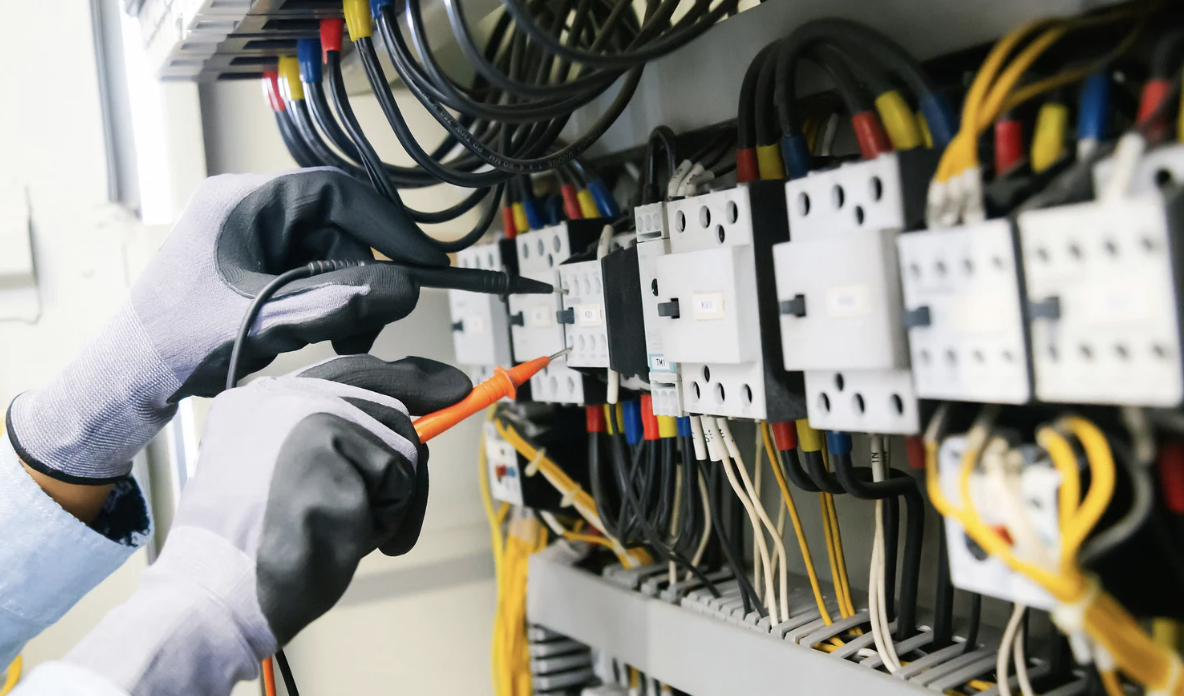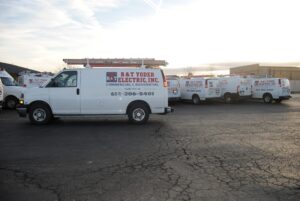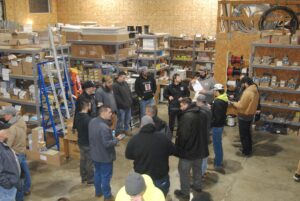
For any business, electrical systems are crucial to daily operations, powering everything from lighting and HVAC systems to essential equipment and technology. A sudden electrical failure can result in costly downtime, productivity loss, and potential safety hazards. Preventing these interruptions requires regular electrical maintenance by a qualified commercial electrician who understands the unique demands of commercial systems. This guide highlights the importance of commercial electrical maintenance, key maintenance tasks, and tips to keep your business running smoothly and safely.
Why Regular Electrical Maintenance is Vital for Businesses
Minimizing Downtime and Revenue Loss
Unexpected electrical issues can halt business operations, causing costly downtime. Each hour of interrupted service impacts revenue and productivity, especially in industries that rely heavily on technology and machinery. Regular electrical maintenance can prevent these disruptions by identifying and addressing potential issues before they lead to a breakdown.
Enhancing Employee and Customer Safety
Faulty electrical systems pose significant risks, including electrical fires, shocks, and short circuits. Regular maintenance by a commercial electrician helps identify and repair hazardous issues, ensuring a safe environment for both employees and customers. Keeping your system in top shape also reduces liability risks associated with electrical-related accidents.
Reducing Long-Term Repair Costs
Preventative electrical maintenance saves on repair costs over time by addressing minor issues before they escalate into larger, more expensive problems. For instance, worn-out wiring or loose connections can lead to major failures if ignored. Proactive maintenance reduces the need for emergency repairs and extends the lifespan of electrical components.
Compliance with Safety Codes and Regulations
Commercial properties must meet specific electrical codes and standards to ensure safe operation. Regular maintenance helps ensure that your business remains compliant with these codes, avoiding potential fines or penalties from regulatory bodies. A licensed commercial electrician is knowledgeable about local codes and can help your business maintain compliance.
Key Electrical Maintenance Tasks for Businesses
1. Routine Inspections
Routine electrical inspections are essential for spotting issues that could lead to downtime or safety hazards. A commercial electrician will conduct a thorough assessment, checking for issues such as frayed wires, overheating components, loose connections, and outdated circuit breakers. Regular inspections also help identify areas for improvement, such as upgrading to energy-efficient lighting or modern wiring.
2. Testing Circuit Breakers and Panels
Circuit breakers and panels are crucial for managing electrical loads safely. Over time, panels can become overloaded, or breakers may start to wear out, leading to tripping or electrical failures. During maintenance, a commercial electrician will test your panels and circuit breakers to ensure they’re operating correctly and meeting your business’s power demands.
3. Inspecting and Replacing Wiring
Wiring issues, such as frayed insulation or corroded wires, can lead to dangerous situations, including electrical fires and short circuits. Older commercial buildings may also have outdated wiring that can’t handle modern power requirements. Inspecting and replacing faulty or outdated wiring is a key maintenance task that prevents interruptions and ensures your system meets current safety standards.
4. Thermographic Scanning
Thermographic scanning is a technique that uses infrared imaging to detect overheating components within your electrical system. Overheating often indicates issues like loose connections, overloaded circuits, or failing equipment. Regular thermographic scans performed by a commercial electrician can detect these problems early, allowing for quick repairs before they escalate.
5. Testing Emergency and Exit Lighting
Emergency and exit lighting are critical for guiding people safely out of the building during power outages or emergencies. These lights should be inspected regularly to ensure they’re functioning correctly and are in compliance with safety codes. Maintenance of emergency lighting not only meets legal requirements but also contributes to overall building safety.
6. Grounding and Bonding Inspections
Proper grounding and bonding are essential for safe electrical operation. Grounding provides a path for excess electricity to flow safely into the earth, protecting both people and equipment from electric shock. Regular grounding inspections help ensure that all equipment is properly grounded, reducing the risk of electrical hazards.
7. Maintenance of HVAC and Other Essential Systems
HVAC systems rely on electricity to maintain a comfortable environment for employees and customers. Malfunctioning HVAC systems can lead to discomfort and productivity loss, especially in extreme weather conditions. Regular electrical maintenance of HVAC systems and other essential equipment, such as backup generators, is crucial for continuous operation.
8. Updating Outdated Systems
Electrical technology evolves rapidly, and outdated systems may not be as efficient or safe as modern ones. Older electrical systems may lack capacity for today’s power needs, leading to frequent overloads and potential downtime. A commercial electrician can recommend upgrades to improve efficiency and reliability, helping your business remain competitive and compliant.
Benefits of Hiring a Commercial Electrician for Maintenance
Expertise in Commercial Systems
Commercial electricians are specifically trained to work with complex systems that differ from residential setups. Their expertise allows them to handle higher power demands, understand commercial codes, and address issues unique to business environments. This specialized knowledge ensures that your electrical system receives the attention it needs to operate safely and efficiently.
Access to Advanced Tools and Technology
Commercial electricians have access to advanced diagnostic tools, such as thermographic scanners and voltage meters, allowing them to identify issues with greater accuracy. Using these tools during maintenance, they can detect hidden issues like overheating or excessive voltage drops that may not be visible during a basic inspection.
Compliance and Liability Reduction
Hiring a licensed commercial electrician for regular maintenance helps ensure compliance with local codes and safety standards, reducing the risk of accidents and liability. Electricians are knowledgeable about the regulations that govern commercial properties, helping you avoid fines, penalties, and potential legal issues.
Cost-Effective Long-Term Solutions
While regular maintenance comes with upfront costs, it provides long-term savings by minimizing costly emergency repairs, extending equipment lifespan, and reducing energy waste. Commercial electricians work to optimize your system, ensuring that it operates at peak efficiency and identifying ways to save on energy costs.
Preventative Maintenance Tips for Business Owners
1. Schedule Regular Maintenance Checks
Regularly scheduled maintenance is essential to prevent electrical failures. Work with a commercial electrician to create a maintenance schedule tailored to your business’s needs. Frequent checks, such as quarterly or biannual inspections, help keep your system in optimal condition and reduce the risk of unexpected downtime.
2. Monitor Energy Usage
Keeping track of your business’s energy usage can help you spot potential issues early. If you notice sudden increases in energy consumption, it may indicate an electrical issue, such as inefficient lighting or malfunctioning equipment. Regular monitoring allows you to address these issues before they affect your operations.
3. Train Employees to Recognize Electrical Issues
Employees should be aware of common electrical issues, such as flickering lights, frequent breaker trips, or unusual sounds from equipment. Encouraging employees to report any anomalies allows you to address minor problems before they turn into major disruptions.
4. Invest in Surge Protection
Power surges can damage sensitive equipment and lead to costly repairs. Installing whole-building surge protection helps safeguard your business from power surges, especially if you rely heavily on technology. Surge protection systems can be installed by a commercial electrician, providing long-term protection for computers, machinery, and other equipment.
5. Consider Energy-Efficient Upgrades
Energy-efficient lighting, HVAC systems, and other upgrades reduce operational costs while lessening the load on your electrical system. Switching to LED lighting, for example, reduces energy consumption and minimizes the risk of circuit overloads. A commercial electrician can help you identify and implement energy-efficient solutions to benefit your business.
Signs Your Business Needs Immediate Electrical Maintenance
Frequent Circuit Breaker Trips
Circuit breakers that trip frequently signal that your system is overloaded or experiencing a fault. This issue can disrupt operations and, if left unaddressed, lead to more serious electrical problems. A commercial electrician can assess the breaker’s capacity and make necessary adjustments or replacements.
Flickering or Dimming Lights
Flickering or dimming lights are often signs of loose wiring, overloaded circuits, or faulty fixtures. These issues may seem minor but can pose significant safety risks if ignored. Regular maintenance addresses these issues before they escalate, ensuring a reliable lighting system for your business.
Overheating Outlets or Equipment
If you notice that outlets, wires, or equipment are warm or hot to the touch, this may indicate an overload or faulty wiring. Overheating can lead to fire hazards and should be inspected immediately by a commercial electrician to determine the cause and implement a solution.
Aging or Outdated Equipment
Older equipment is more likely to fail or cause electrical issues. As machinery and systems age, they may require more frequent repairs or upgrades. If your business relies on aging equipment, consider consulting a commercial electrician about modernizing your electrical system to support reliable operation.
Conclusion: Maintain a Reliable and Safe Business Environment with Regular Electrical Maintenance
Regular commercial electrical maintenance is essential for preventing downtime, ensuring safety, and protecting your investment in equipment and infrastructure. A commercial electrician provides the expertise necessary to keep your systems in peak condition, minimizing the risk of unexpected interruptions and costly repairs. By implementing a proactive maintenance schedule, you create a safe, efficient, and reliable environment for both employees and customers. Investing in preventative maintenance pays off in long-term savings and operational stability, helping your business thrive.
Frequently Asked Questions
How often should commercial electrical maintenance be performed?
It’s generally recommended to schedule maintenance at least twice a year. High-demand environments may benefit from quarterly checks to ensure optimal performance and safety.
What are common signs that my business needs electrical maintenance?
Frequent breaker trips, flickering lights, overheating outlets, and increased energy bills are indicators that maintenance may be needed.
How can a commercial electrician help improve energy efficiency?
A commercial electrician can recommend energy-efficient upgrades, such as LED lighting or updated HVAC systems, that reduce energy consumption and lower operational costs.
What is thermographic scanning, and how does it help with maintenance?
Thermographic scanning uses infrared imaging to detect overheating components. It’s a preventative measure that identifies potential issues before they cause failures.
Is preventative maintenance more cost-effective than emergency repairs?
Yes, regular maintenance helps identify and fix minor issues early, reducing the likelihood of major, costly repairs and extending the lifespan of equipment.







